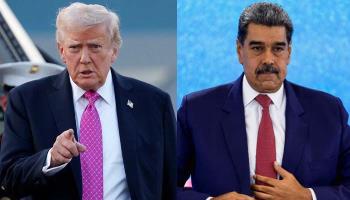Alwaght- Despite the last-minute US efforts to block the release of the Iranian oil tanker Adrian Darya 1, the vessel finally was released by Gibraltar court. The Adrian Darya 1, previously named Grace 1, headed east into the Mediterranean Sea on Monday hours after authorities in Gibraltar rejected a request from Washington to hold the ship.
On July 13, the British navy seized the Iranian tanker upon its passage from the Strait of Gibraltar under the excuse of violating the European sanctions by carrying oil to a Syrian refinery. Gibraltar is one of the 14 British overseas territories which has been under London rule since 1713.
Release of the ship is seen as another blow to Washington’s anti-Iranian strategy marked by political and economic pressures. When it was announced that Gibraltar will not extend the detention of the ship for another 30-days, the American administration took pains to block its release. But to its frustration, it was Iran that have the upper hand in handling the case and pressing Britain for the release.
A couple of days before Gibraltar court ruling, National Security Advisor John Bolton visited London, a trip certainly aimed at persuading the British government to stay in the US’s anti-Iranian game. Despite that, London retreated from its position and ruled to freedom of the Iranian tanker.
Washington, however, continued its pressure, seeking Gibraltar government’s cooperation. On Thursday, as word about the vessel release spread, the US Department of Justice sent a letter to Gibraltar government asking it to keep the ship in detention. The US justified its call by such charges as violation of the US sanctions, money laundering, and support for terrorism. As Gibraltar rejected the call, Washington threatened the crew. Secretary of State Mike Pompeo tweeted: “A message to all mariners – if you crew an IRGC or other FTO-affiliated ship, you jeopardize future entry to the US.”
Clearly, the dispute of tankers between Iran and Britain marked another failure to the US administration’s hardliners despite the hard push to continue the seizure.
Release of the Iranian tanker with a court ruling in addition to being a legal victory was a rejection of the accusations against Iran by the previous British officials and also their US allies. Additionally, the case once again highlighted the efficiency of Iran’s resistance strategy in the face of foreign pressures. This, analysts agree, doubles the American concerns about Iran’s strategy setting an example for the regional nations. After all, the victory sent a serious message to the other countries telling them that resistance, not compromises, is a suitable choice in the face of the American pressures.
Why was the vessel’s name changed?
Grace 1 was renamed to Adrian Darya on Friday with its flag changing to Iran’s instead of Panama’s. Some have assessed the measure as a move to bypass the US sanctions, something rejected by the Iranian diplomatic and maritime officials.
Deputy Head of Iran’s Ports and Maritime Organization for Maritime Affairs Jalil Eslami commented on the issue, saying that while Grace 1 was in detention, the Panama government ended the license for the vessel to fly Panamanian flag. He continued that according to a request by the ship's operator, it now flies an Iranian flag.
On Sunday, Baeidinejad, confirming the remarks, said in a Twitter message said that name change caused the wrong notion for some that Iran renamed the tanker to circumvent the American sanctions. But the fact is that Panama has ended permission for the ship sailing with its flag, triggering renaming and registration in Iran.
Did Tehran make any promise to London?
Since the beginning, Iran called the ship seizure “piracy” and violating international laws. Tehran denied London claims that the ship was bypassing the European sanctions against Syria and argued that Britain’s action was a game in a Washington scenario against the Islamic Republic. At the time, Gibraltar officials said that the detention was affected by a third-party country. A BBC analyst confirmed that the seizure was influenced by the US. London’s move came while at the time Britain was busy choosing its new prime minister and the candidates were rivaling for service to the US.
Upon the release, the British government claimed that Iran submitted written commitment not to circumvent the sanctions on Syria. The British Foreign and Commonwealth Office stated that the Gibraltar government received guarantees from Tehran that the oil tanker will not sail to Syria and Tehran should adhere to the commitment. The statement continued that no parallel should be drawn between Iran’s seizure of the British oil tanker in the Persian Gulf and the Gibraltar detention of the Iranian vessel which comes to implement the European sanctions on Syria.
But Iranian officials categorically rejected the British claims about any commitment. Abbas Mousavi, Iran’s foreign ministry spokesman, told the journalists that Iran submitted no guarantees that the ship will not head to Syria because since the moment of detention Tehran stated that the ship was not bound for Syria and Iran still keeps its words. “Even if it was heading to Syria, it was nobody’s business,” Mousavi continued. The spokesman added that such allegations were aimed at a face-saving exit from the crisis caused by the “apparently illegal action and piracy.”



























